Iran executes man accused of deadly 2023 Azerbaijan embassy shooting
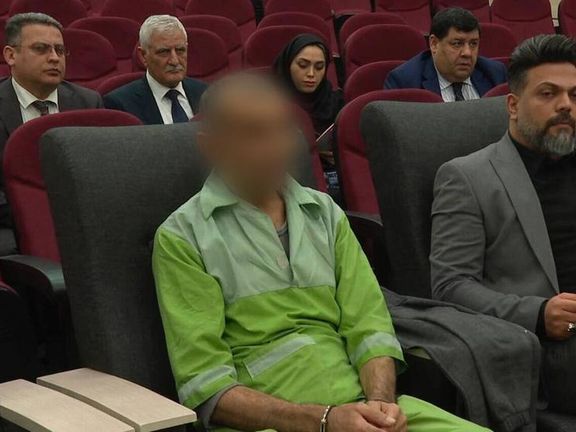
Iran on Wednesday executed the man convicted of a deadly 2023 attack on the Azerbaijani embassy in Tehran, the judiciary’s official news agency Mizan reported.

Iran on Wednesday executed the man convicted of a deadly 2023 attack on the Azerbaijani embassy in Tehran, the judiciary’s official news agency Mizan reported.
The attacker, identified as Yasin Hoseinzadeh, stormed the embassy in January 2023, armed with a Kalashnikov rifle.
He broke through the security post and opened fire, killing the head of the embassy’s security service, Orkhan Asgarov, and injuring two others — Vasif Taghiyev and Mahir Imanov — who tried to stop the attack, according to APA.
At the time, Azerbaijani President Ilham Aliyev condemned the attack on social media, calling it a “terrorist act” and “unacceptable.”
Iranian authorities said the attacker acted on a personal motive, believing his wife was inside the embassy and refusing to see him.
He was sentenced to death for murder, illegal possession of firearms, and disturbing public order. The Supreme Court upheld the verdict, and the sentence was carried out on Wednesday morning.
The attack led to the suspension of Azerbaijan’s embassy operations in Iran. Diplomatic staff and their families were evacuated shortly after the incident, and the mission only resumed work at a new location in July last year following negotiations between the two countries.
Relations between the two neighbours have been tense, with Azerbaijan accusing Iran of mistreating its ethnic Azeri population, and Tehran expressing concern over Baku’s close ties with Israel and possible regional border shifts following the Armenia-Azerbaijan conflict.
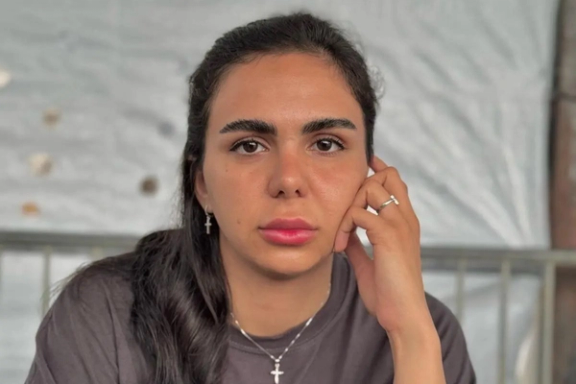
A US congresswoman of Iranian descent has introduced legislation named after an Iranian Christian covert to block expedited deportations to countries where they may face persecution.
The 'Artemis Act' unveiled on Tuesday honors Artemis Ghasemzadeh, a 27-year-old asylum seeker who was expelled to Panama by the Trump administration after entering the US via its southern border.
She was denied a legally mandated interview and placed on a military flight without notice, her attorney said.
“Artemis Ghasemzadeh was denied the due process afforded to asylum seekers by law, plain and simple,” Arizona Democratic Representative Yassamin Ansari. “Returning to the Islamic Republic of Iran would mean immediate—potentially deadly—danger for her, both as a woman and a Christian convert.”
“People like Artemis who are fleeing religious persecution should not be subject to expedited removal. They deserve a chance to plead their case–that's what my bill will guarantee,” she wrote on X.
Ghasemzadeh fled Iran after members of her underground bible study group were arrested. She told Iran International she was misled about her transfer, held in a jungle detention camp in Panama, and forced to subsist on contaminated water and stale bread.
“The food just helps us stay full and not die,” she said at the time, using a shared phone before being cut off.
The proposed Artemis Act would prohibit deportations to any country listed by the US government as committing “particularly severe violations of religious freedom,” aiming to prevent removals like Ghasemzadeh’s.
Her lawyer has filed a complaint with the Inter-American Court of Human Rights against both US and Panamanian authorities.
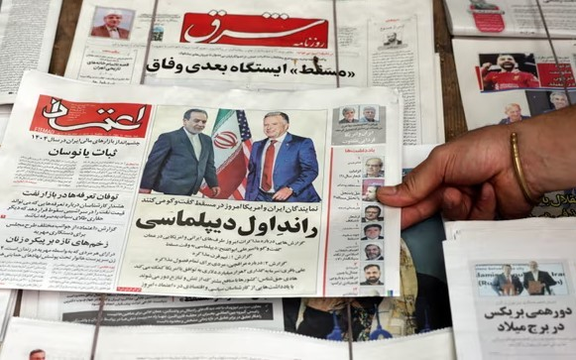
Iran's Supreme National Security Council issued a directive on Tuesday banning domestic media from translating or republishing foreign reports on the country’s negotiations with the United States or offering any analysis on the talks.
The SNSC directive, a copy of which was obtained by Iran International, warned that failure to comply would be considered an act of threatening national interests and security.
It instructed media outlets and editors to only rely on official statements from the Iranian Foreign Ministry—namely, the foreign minister and the ministry’s spokesperson—for any coverage related to the ongoing talks.
The directive was published hours after Iran's Supreme Leader Ali Khamenei said that the current indirect nuclear talks with the United States are unlikely to succeed.
"Translating or republishing negotiation-related news from foreign sources including foreign state or non-state media, social networks, online activists, or any other sources is strictly prohibited and considered contrary to national interests and security," the notice said.
The council also warned against publishing any analysis, interpretation or speculation—whether supportive or critical—about the content or outcome of the negotiations.
"Media outlets are also expected, in order to maintain national unity, preserve public psychological calm, support the negotiating team, and convey a unified message to both domestic and international audiences," it continued.
Outlets must "refrain entirely from publishing any analysis, prediction, interpretation, or independent commentary regarding the details of the negotiations, the positions of the opposing parties, or conclusions based on unofficial reports," it added.
The directive emphasized that the restrictions are aimed at preventing the spread of misinformation and ensuring consistency in the country’s foreign policy messaging.
The 2024 Reporters Without Borders (RSF) World Press Freedom Index ranked Iran 176th out of 180 countries assessed, citing state control of the media landscape and the arbitrary arrest and prosecution of journalists before revolutionary courts.

Iran’s top cybercrime official said that many websites and online platforms advertising sigheh or temporary religious marriage are designed to defraud users, even after an investigation by Iran International last week demonstrated it was a genuine industry.
“Many users fall for false promises and suffer serious financial and reputational damage,” said Vahid Majid, head of Iran’s Cyber Police (FATA), in remarks to Tasnim, a news agency affiliated with the Iran's Islamic Revolutionary Guard Corps.
He said the police were taking “consistent and firm action against websites facilitating sigheh, matchmaking.”
Majid added that victims often avoid filing complaints due to concerns over honor and privacy, hampering legal follow-up.
Police continue to track offenders even in the absence of formal complaints, he added, warning that “sigheh-related pages were under full surveillance.”
The remarks followed Iran International's reporting last week that while many of these platforms are indeed fraudulent, some do function. The outlet contacted several Telegram channels and found that in some cases, women responded, sent voice notes, or even agreed to meet in person in case of a cash exchange.
Although the Islamic Republic denies endorsing these services, the investigation pointed to a functioning market where sex work is marketed as religiously-sanctioned contract marriage.

US Secretary of State Marco Rubio gave an expansive view of negotiations with Iran on Tuesday, telling a Senate Committee that the United States rules out Iranian enrichment and could maintain missile and terrorism related sanctions after any deal.
Iranian enrichment
"Once you know how to enrich at any level, all you need is time to be able to enrich at a higher level. And they've already proven the ability to enrich at a higher level. In fact, they have and are doing so now," Rubio said on Tuesday.
"They claim that enrichment is a matter of national pride. It is our view that they want enrichment as a deterrent, they believe that it makes them a threshold nuclear power, and as a result, becomes untouchable," Rubio told the Senate Foreign Relations Committee. "That is the crux of the situation we're facing right now."
"Our hope is that we can encourage them to show them a path towards prosperity and peace that allow them to develop their economy, that allow them, if they want, to have a civil nuclear energy program like other countries around the world have - without enrichment."
Terrorism, missile sanctions
"Obviously we're aware of their sponsorship of terrorism in the region, including the Houthis and Hezbollah and other groups such as these, the militias in Iraq and their efforts to get back into Syria. Right now, the focus at this point of (the talks) has been their enrichment capability and their insistence on enrichment capability," Rubio said.
"Ultimately, I would say that if in fact we have sanctions that are related to the sponsorship of terrorism and a violation of weapons conventions and the like, their long-range munitions—those sanctions will remain. If those aren't part of the deal, then the sanctions will remain as a result of that," he added.
"The focus of the conversations over the last few weeks with (US special envoy) Witkoff and the Iranians has been on this enrichment matter, which is by far sort of the core and most critical matter."
Maximum pressure
"The administration sanctioned 72 entities, 14 individuals, 74 vessels, as well as 18 additional entities, including two Chinese-based oil terminals, 13 vessels," Rubio said.
"I think the maximum pressure campaign is working. We're already seeing a reduction in Iran's ability to fund destabilizing operations across the region ... we're going to continue with sanctions until there's a deal," he told the Senate Foreign Relations Committee.
"The administration’s maximum pressure campaign has secured the release of the last living American hostage held by Hamas, a pledge by the Houthis to abandon attacks on American ships and forced Iran to beg for talks with the United States," Rubio said earlier in the day in prepared remarks submitted to the committee.
European sanctions
"There's a separate set of sanctions out there, which are the snapback provisions that the E3 in Europe have," Rubio said, referring to Britain, France and Germany - the European signatories to a lapsed 2015 nuclear deal with Iran.
"That's on another clock, completely different from ours ... Now, maybe we'll do a deal with Iran and they'll be satisfied with it and not impose their sanctions," he added.
"They are moving forward on their process, independent from ours."
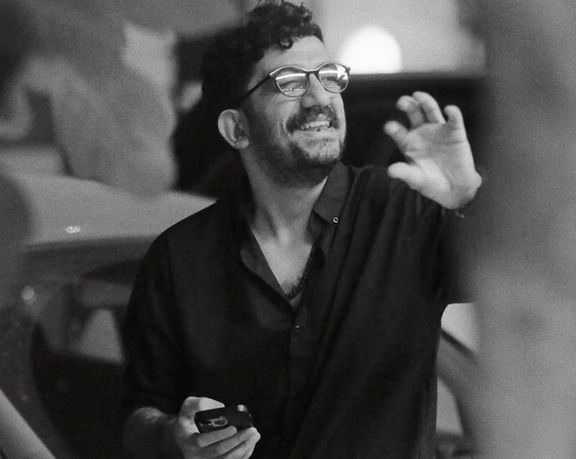
Dissident Iranian composer Mehdi Rajabian has become the first Iranian to win a Telly Award for his work on Mercedes-Benz's promotional teasers, after years of imprisonment for his underground musical activities and outspoken advocacy for artistic freedom.
The Telly Awards, established in 1979, honor excellence in video and television across all screens.
Rajabian whose compositions have been featured in several Mercedes-Benz promotional materials, was recognized at the 46th edition of the awards.
His music was featured in teasers for the Mercedes-Benz 300 SLR, the brand's most expensive model, and for Earth Day campaigns.
"The award has previously been given to the creators of teaser music for BMW, Toyota, Meta, Adidas, Apple, and Netflix, as well as to producers of content from The Washington Post, Al Jazeera, Fox News, NBC, Bloomberg, Warner Bros., and others," Rajabian said on his Instagram, dedicating the prize to his fans.
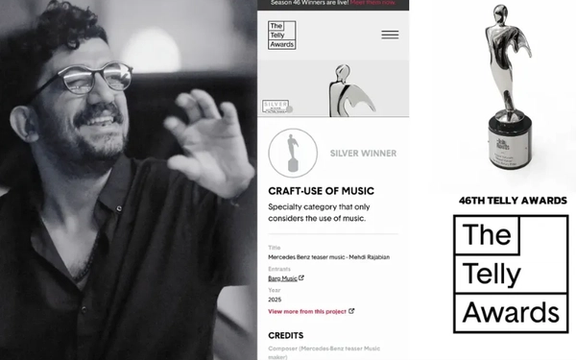
The Iranian artist was honored in 2023 with the United Nations' Minority Artist Award, which recognized his efforts to highlight issues of discrimination and human rights through his art.
"Happiness is a collective event, and unfortunately, no one is happy here [Iran]. The situation has changed completely after the recent protests. No award can be a criterion for determining an artist's artistic value, but it can certainly be a platform for the voice of human rights and artistic freedom,” said Rajabian in a statement on his UN award.
He previously faced imprisonment in Iran for his musical activities, enduring solitary confinement and a hunger strike.
Rajabian was arrested in 2013 for releasing underground music and was charged with “propaganda against the government”. He was put in solitary confinement for three months and then released on bail.
He was again arrested in 2015 for his album The History of Iran Narrated by Setar, a lute-like instrument used in traditional Persian music.
In Tehran’s notorious Evin prison, Rajabian began a 40-day hunger strike that led to his release on parole in 2017.
Rajabian was arrested again in 2020 for his album Middle Eastern but did not spend time in jail and was released on bail. He was accused of “encouraging prostitution” because females were singing in the album.